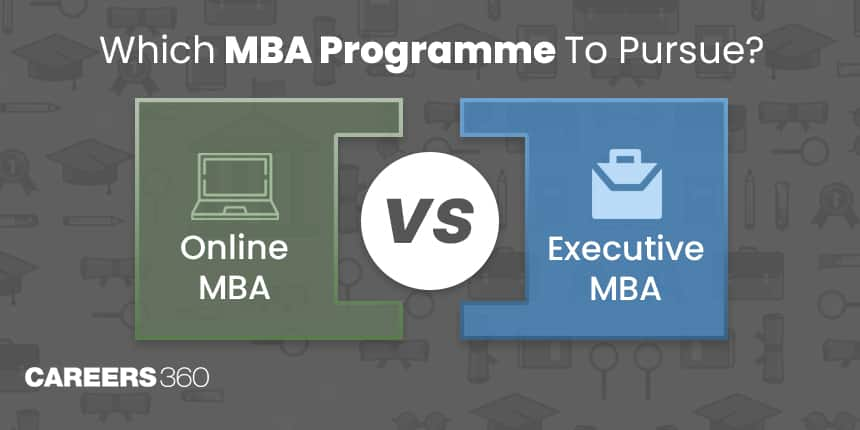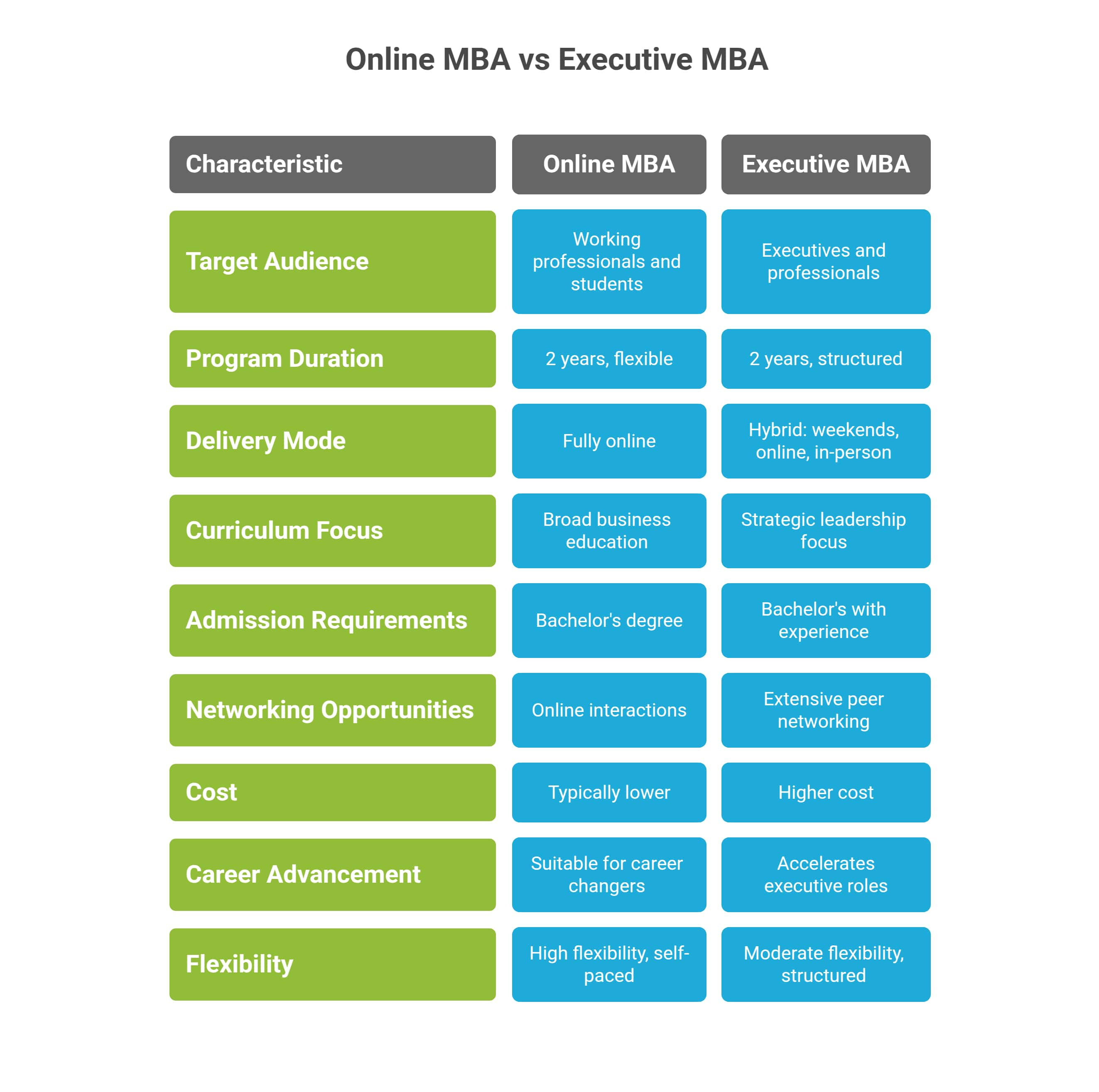IFMR Graduate School of Business MBA Admissions 2026
MBA Admissions Deadline 28th Feb'26 | UGC Approved Programs | Near 100% Placement Record | Up to 100% Scholarships | Highest CTC 21.32 LPA
Master of Business Administration (MBA) is one of the popular management programmes among graduates and working professionals. With the demand for candidates with business and management skills, both Online MBA and Executive MBA emerge as popular choices, catering to working professionals. However, these programmes differ significantly in terms of their focus, delivery, and value proposition.
This Story also Contains

While an Online MBA allows individuals to earn their degrees without quitting their jobs, an Executive MBA is designed for seasoned professionals with management experience. Both programmes have their distinct advantages for career advancement and understanding their differences is crucial to choose the right programme.
Online MBA and Executive MBA programmes are ideal for professionals aiming to advance their careers without putting their jobs on a halt. An Online MBA is a two-year programme primarily through digital platforms, with asynchronous learning where students engage with course materials at their own pace and schedule.
MBA Admissions Deadline 28th Feb'26 | UGC Approved Programs | Near 100% Placement Record | Up to 100% Scholarships | Highest CTC 21.32 LPA
Comprehensive 4-year BBA with a 3-year exit option under NEP 2020. Core coverage of Finance, Marketing, Entrepreneurship, Analytics & HR
An Executive MBA is a two-year management programme delivered in hybrid mode with major focus on on-campus modules. The programme is often held on weekends, supplemented by online coursework. Admission to online MBA courses is done based previous academic performance with some college require candidates to have a minimum of 1-3 years of experience. To enrol in Executive MBA courses, candidates must have a certain year of work experience in a relevant industry.
Also Read: 10 Myths and Facts About an Online MBA
Here are the key differences between an Online MBA and an Executive MBA to help students make an informed decision on the programme that best fit their career goals.

Candidates are required to meet the online MBA eligibility criteria before enrolling. The table highlights the common online MBA qualification that students must confirm before enrolling for the programme:
| Particulars | Value |
|---|---|
| Executive MBA eligibility criteria | A bachelor's degree with a minimum 50% marks (45% for reserved categories) in aggregate from a recognised university |
Some universities ask for the management entrance exams such as CAT, XAT, MAT, CMAT, and SNAP while others take direct admission |
Recognized as Category-1 Deemed to be University by UGC | 41,000 + Alumni Imprints Globally | Students from over 20+ countries
Highest CTC International 23.31 LPA | Highest CTC Domestic 12.5 LPA | Average CTC 7.5 LPA | Avail Merit Based Scholarships
Students are required to have a graduation degree in any discipline from a recognised university. The table below highlights the online executive MBA eligibility criteria:
| Particulars | Value |
|---|---|
| Executive MBA eligibility criteria | Candidates aspiring to take Executive MBA courses must have graduated in any discipline |
| Candidates are required to take an entrance exam specified by the university | |
| They also must have three to five years of work experience in a relevant field | |
Shortlisted candidates are required to participate in group discussions and personal interviews |
Also Read: Top Online Executive MBA Colleges in India [2025]
Both online MBA and Executive MBA programmes are strategic career investment, but choosing the right one must be aligned with your professional trajectory. If you are looking to advance your career while maintaining work responsibilities, an online MBA programme is for you.
Conversely, if you look for refining your strategic thinking and leadership capabilities to pursue senior leadership roles, an Executive MBA is for you. Choosing the right programme to pursue also depends on your geographic mobility, learning effort, and functional expertise.
An Online MBA emerged as a flexible alternative to traditional in-person programme, making it ideal for professionals in earlier career stages seeking to build foundational business acumen while working full time. An Executive MBA provides transformative leadership and strategic thinking capabilities for seasoned managers looking for senior executive roles.
Resource Links for Online MBA
Several top universities in India offer Executive MBA courses. These courses can be pursued by professionals without disrupting their jobs or other commitments. The fee of an Executive MBA varies from one institute to another, ranging from Rs 30,000 to Rs 31 lakhs. The table below lists the top Executive MBA colleges in India.
| Executive MBA Colleges | Total Executive MBA Fees |
|---|---|
Rs 5,25,000 | |
Rs 6,93,000 | |
Rs 2,65,670 | |
Rs 31,00,000 | |
Rs 33,00,000 | |
Rs 1,00,000 | |
Rs 6,00,000 |
Several private and government colleges in India offer online MBA courses. The fees of an online MBA in government colleges are slightly lower than the private colleges. Students can enrol in a college based on their affordability and convenience. The table below lists some of the top online MBA colleges in India.
Online MBA Colleges | Total Online MBA Fees |
|---|---|
Rs 1,99,000 | |
Rs 1,75,000 | |
Rs 67,000 | |
Rs 1,50,000 | |
Rs 1,70,000 | |
Rs 2,00,000 | |
Rs 2,10,668 | |
Rs 2,00,000 | |
Rs 65,500 - Rs 85,500 | |
| NMIMS Online | Rs 1,96,000 |
Also Read: 10 Reasons Why You Should Get an Online Executive MBA in 2025
As professionals increasingly look to upgrade their skills, an MBA degree, whether it is online MBA or an Executive MBA, is a viable career investment. By understanding your professional trajectory, learning preferences, and personal circumstances, you can make an informed decision whether to choose an online MBA or an Executive MBA and excel in your career.
Frequently Asked Questions (FAQs)
Executive MBA is a professional programme, creating numerous career opportunities in the management field.
The minimum online MBA qualification is a bachelor’s degree in a relevant stream with minimum passing marks from a recognised university.
An executive MBA is equivalent to a master’s degree. It is particularly beneficial for working professionals, business executives and entrepreneurs.
After completing your MBA programme, you can pursue a career as a financial manager, financial advisor, business manager, project manager, sales manager, senior business analyst and others.
Some of the top recruiters are TCS, Wipro, Flipkart, Amazon, Reliance, KPMG, and Capgemini.
On Question asked by student community
Hello
If you are looking to take admission in the MBA programme with a CAT score of 73, check out the list of MBA Colleges accepting 70-80 percentile .
All the best!
Hi Apurva, TCS is one of the reputed multinational of India providing numerous job opportunities to students. The TCS Job available after an online MBA include business analyst, hr executive, project manager, IT consultant and many more. Please check top careers at TCS with online MBA to know more job
Hello, you can get the best colleges for online MBA here. Many top Bschools today also provide online MBA programmes including IIM Ahmedabad, IIM Bangalore, and XLRI Jamshedpur.
There are several government and private colleges in India offering UGC-recognised Online MBA. Some of which are as follows:
Here are some useful article links for more read :
UGC Approved Online MBA Colleges in India 2026: Complete List, Fees,
Ranked among top 10 B-Schools in India by multiple publications | Top Recruiters-Google, MicKinsey, Amazon, BCG & many more.
Among top 100 Universities Globally in the Times Higher Education (THE) Interdisciplinary Science Rankings 2026
Apply for UG & PG programs from Victoria University, Delhi NCR Campus
Application Deadline: 10th March | Globally Recognized by AACSB (US) & AMBA (UK) | 17.8 LPA Avg. CTC for PGPM 2025
Industry Internship Training
NAAC A++ Accredited | Ranked #12 by NIRF